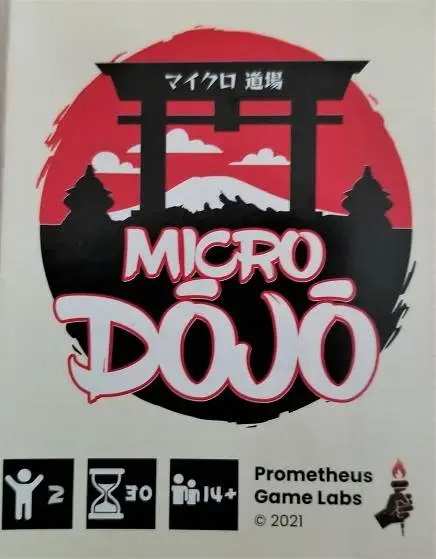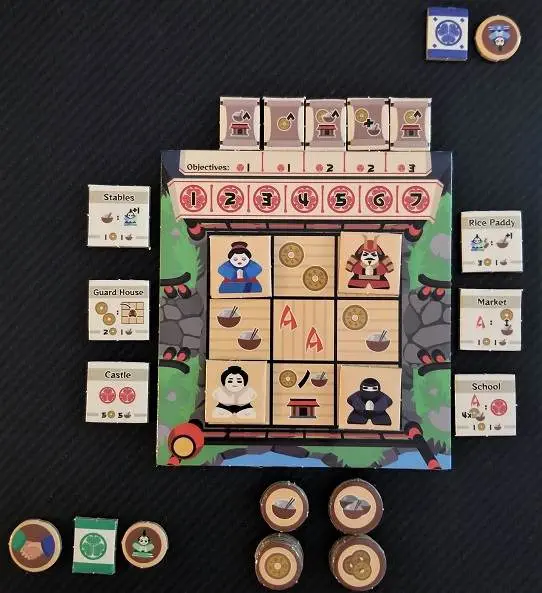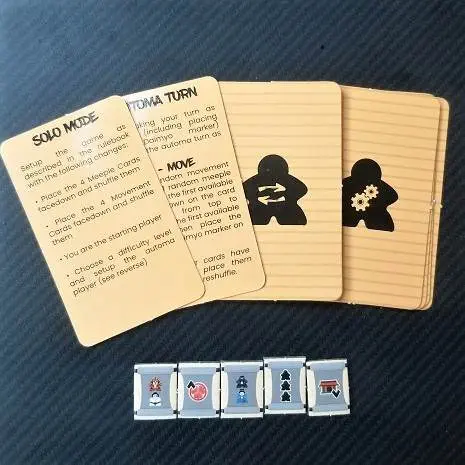
The Shogun has issued an edict. In order to gain his favor and win the title of the local town, you and a rival will take on the roles of Daimyo (feudal lords in the Edo era) and compete to bring prosperity to its citizens. Micro Dojo is the first of what will hopefully be many games from Prometheus Game Labs. This 1-2 player micro game launched on Kickstarter in May of 2021 and was designed by Benjamin Downton. As a Kickstarter backer for this project, we were impressed by how quickly it arrived at our doorstep (just yesterday!). All of the artwork was provided by David Grigoryan and El’Ton Studio. Cultural and historical consultations for the art and game content were provided by several sources to ensure accuracy. The entire project really comes together and is a wonderful game that we plan on playing in between other projects as it is relatively quick at only 30 minutes per play.
When setting up a game of Micro Dojo, it is important to keep in mind that, though the game is small, there does need to be a bit of space available around the edges of the board. Once the board is in place, the four character meeples are placed at random in each of the corners. All resources are separated by type and placed near the board within easy reach. Five Objectives and six Buildings are chosen at random and placed in their designated spaces around the board. Each player chooses a color and receives the corresponding Daimyo token and Score Marker. The first player is chosen at random and the second player receives the Influence token. If playing with solo rules or advanced rules, there are a few modifications to the basic setup of the game, but these changes can be found within the rules themselves.
Micro Dojo is a very simple game in terms of gameplay, but where it really shines is the levels upon levels of strategy regardless of playing the solo, basic, or advanced versions of the game. During a player’s turn, they choose one of the four meeples, move them orthogonally on the board, and resolve the space the meeple landed on. That player’s Daimyo token is then put atop the used meeple designating that it can not be used again until the token has been removed. The exception to this is that once per game, the player in possession of the Influence Token may use it to remove a Daimyo from a meeple before deciding which one to use. When resolving spaces, players can earn resources, build or remove buildings, or take special actions. These actions can include trading two resources of one kind for the other, donating resources for points, activating special abilities granted by specific buildings, or triggering objectives. Play continues in this manner until one of two conditions is met: either a player earns 7 points or all objectives have been triggered. The player with the most points wins.
Here at The Cardboard Cantina, we both have martial arts backgrounds in several different styles. Having trained and taught for years, we know that there is a lot more to it than just kicking and punching. While Micro Dojo doesn’t actually have any fighting in it, the game still exemplifies the concept of mental acuity present in the martial arts mindset. We may not have been physically sparring as opponents, but we were certainly engaged in a strategic battle of the minds. Due to the small size of the board, the choices one makes can heavily impact the game from turn to turn. There is a good amount of thinking that goes into assessing the scenario each game that will keep players coming back. Only a few of the multiple objectives and buildings are used in each game and their variety will make each play seem fresh and engaging. It’s easy to pick up and we already have several people in our circles excited to give this game a try. There is a Tabletop Simulator adaptation endorsed by the publisher if you want to connect with others over a quick and appealing insight into Japan’s bygone past.
Photos of Prometheus Game Labs products were taken and edited by Krista.

